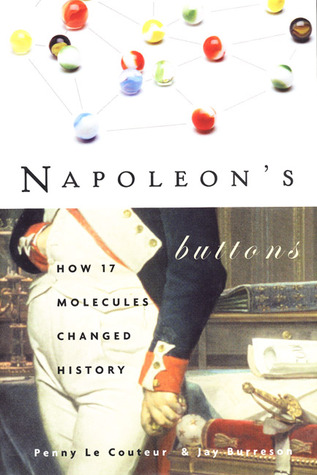 In June 1812, Napoleon's army was 600,000 strong. By early December, however, the once proud Grande Armee numbered fewer than 10,000.
In June 1812, Napoleon's army was 600,000 strong. By early December, however, the once proud Grande Armee numbered fewer than 10,000. "Though many factors have been proposed to explain the failure of Napoleon's 1812 Russian campaign, it has also been linked to something as small as a button-a tin button, the kind that fastened everything from the greatcoats of Napoleon's officers to the trousers of his foot soldiers. When temperatures drop below 56°F, tin crumbles into powder. Were the soldiers of the Grande Armée acutee fatally weakened by cold because the buttons of their uniforms fell apart? How different our world might be if tin did not disintegrate at low temperatures and the French had continued their eastward expansion! This fascinating book tells the stories of seventeen molecules that, like the tin of those buttons, greatly influenced the course of history. These molecules provided the impetus for early exploration and made possible the ensuing voyages of discovery. They resulted in grand feats of engineering and spurred advances in medicine; lie behind changes in gender roles, in law, and in the environment; and have determined what we today eat, drink, and wear."
This book is both original and fascinating; I'm quite sorry that I didn't dive into it sooner. I was quickly absorbed by this refreshing mix of science and history; I learned a lot of both and read this book quite quickly for a science book. There was also the added fact that I had to return it.
I would have liked a little more detail in terms of the historical side of things and a little less chemically; however, that was just my preference. Napoleon's Buttons certainly does go fairly in-depth chemistry-wise, showing the exact formations of many of the substances discussed and how they differ from others. I have to admit that a lot of it went over my head, and I was more interested in the historical detail and how in general the substances affected or could have affected history.
It's kind of obvious that science and the advance of history go hand-in-hand; after all, progress is fueled by new inventions, which are generally scientific, but this book really goes in-depth into certain aspects of this relationship. Although I haven't read Guns, Germs, and Steel, in some ways it seems to me that the authors here are doing something similar, analyzing and interpreting history through unexpected ways. In fact, many things relating to guns (weapons), germs (germ treatment), and steel (development of new materials) have their own sections in this book. The seventeen sections deal with spices (peppers, nutmeg, and cloves); ascorbic acid; glucose; cellulose; nitro compounds; silk and nylon; phenol; isoprene; dyes; "wonder drugs"; the pill; "molecules of witchcraft"; morphine, nicootine and caffeine; oleic acid; salt; chlorocarbon compounds; and "molecules versus malaria". Yet there was no chapter on the title: how Napoleon's soldier's buttons were made out of tin and thus did not fare well in the harsh Russian winter. That was very puzzling, and annoying. Still, I suppose there's not that much more to explain in that case.
I actually found the chapter on the birth control pill quite illuminating. It was interesting both historically and scientifically, and I learned a bit about how it actually works. Many of the other sections were fascinating too; it's stunning to think about the fact that many of the materials and technologies we take for granted today took a long time to develop and perfect. As the authors so astutely point out, without rubber, without dyes, without antibiotics, without many molecules, modern society as we know it wouldn't exist at all.
I'll admit to skimming some of the detailed drawings and diagrams of how the molecules are structured; I just wasn't that interested or in the mood for a detailed chemistry lesson. However, I'm definitely considering getting my own copy of this book so that I can read it more slowly.
Napoleon's Buttons is well-written as well, and I read it fairly quickly for a science book. There are other science books that I've enjoyed more, but this one was still very good.
354 pages.
Rating: ****
Thanks for posting! I'm definitely gonna read
ReplyDelete